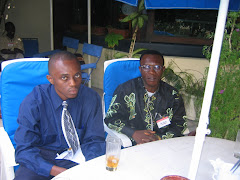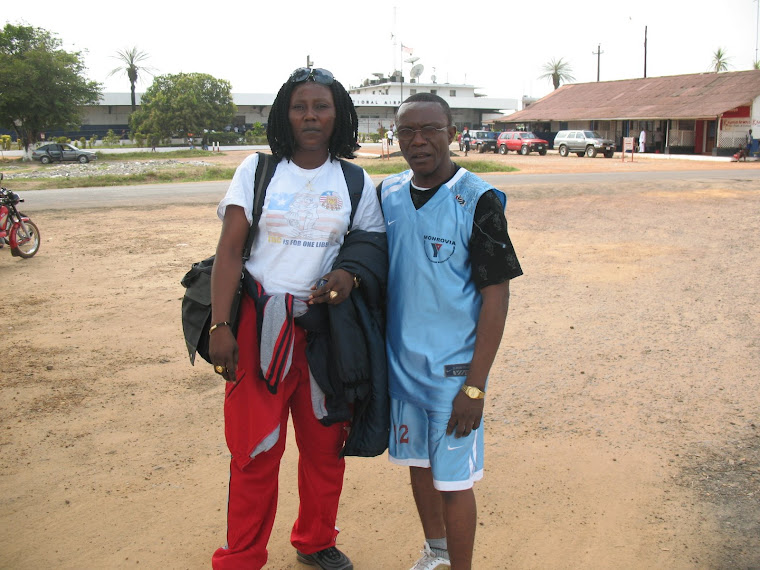…Liberians Anxious To Watch Trial
As the trial of former Liberian President and rebel leader Charles Taylor commenced in The Hague, Liberians are curiously glued to their TV sets and international radio stations to have an idea of the proceeding from the onset before the UN backed Special War crime Court for Sierra Leone now seated in The Hague.
Others Liberians are also rushing to internet cafes while some are seen with local papers that have reported the start of the trial today. “I will want the local TVs and radio stations to relay the trial of President Taylor to allow us see or listen for ourselves,” 17 year Dennis Togba said at an Haiti Center on Carey Street. haiti centers are forums for street corners debates around Monrovia.
Some Monrovia dailies and stations gave the Taylor trial epoch prominent on the pages and the airwaves. The NEW DEMOCRAT and the NEW VISION newspapers are some of the papers that highlighted the Taylor trial prominently.
Already, reports by Reuters say prosecutors called an expert on Sierra Leone's illegal diamond trade that funded one of Africa's bloodiest wars when the trial of former Liberian President Charles Taylor on war crimes charges began in earnest on Monday.
Taylor, once one of Africa's most feared warlords, faces charges of rape, murder, mutilation and recruitment of child soldiers at the U.N.-backed Special Court for Sierra Leone, set up to try those most responsible for the 1991-2002 conflict.
The 59-year-old, the first former African head of state to face an international court, has pleaded not guilty to all charges. He looked relaxed in court, wearing gold-rimmed spectacles, a dark suit and tie.
More than quarter of a million people were killed in intertwined wars in Liberia and Sierra Leone which shocked the world with stories and images of child soldiers high on drugs, killing, raping and looting.
Prosecutors want the trial to set a precedent worldwide and end decades of impunity for African strongmen. Taylor is accused of trying to gain control of Sierra Leone's mineral wealth, particularly its diamond mines, and seeking to destabilize its government by supplying the Revolutionary United Front (RUF) rebels.
Prosecutors called as their first witness Ian Smillie, a Canadian expert on the trade in conflict diamonds or "blood diamonds", smuggled out of Africa and used to fund wars.
Smillie said diamonds had a history of destabilizing Sierra Leone, describing his time as a teacher in a diamond-producing area in 1967-68: "It was very volatile. Almost like a Wild West town ... There were thousands of illicit diamond diggers."
He will be followed by a victim of the violence in Sierra Leone, and then an insider once close to Taylor's regime.
The trial is being held in The Hague because of fears it could spur instability if held in Sierra Leone, as a generation of civilian amputees whose limbs were hacked off by rebels in Sierra Leone have become a painful reminder of the cruelty of the conflict. The cruelties that reign during the conflict were largely reported to have been sponsored by Taylor, who stands accused of bearing greater responsibility for the drugging rebels and militias, often child soldiers who indiscriminately killed, raped and maimed.
Prosecutors intend to call 144 witnesses but hope half of them can submit their testimony in writing, allowing the prosecuting team to wrap up their case in around eight months. They expect a judgment by the end of 2009, though an appeal would be likely to stretch into 2010.
Taylor boycotted the opening of his trial last June in a dispute over the resources allocated to his defense, prompting legal wrangling and repeated delays.
More funds were eventually made available to Taylor and a new defense team was appointed in July. The former strongman is receiving legal aid despite suspicions he amassed a considerable personal fortune.
In the past, ousted African dictators have often fled overseas to live out their days unpunished. Taylor found exile in Nigeria after being overthrown in 2003, but was later handed to the court under international pressure.
Monday, January 7, 2008
Subscribe to:
Post Comments (Atom)




No comments:
Post a Comment